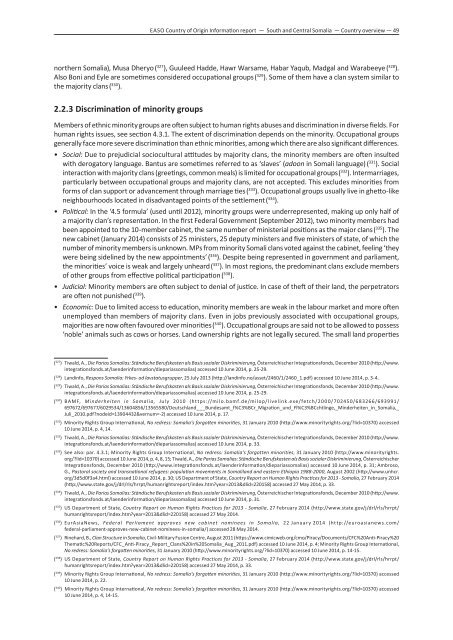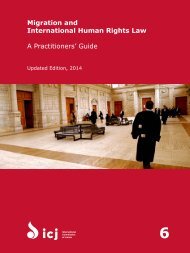Create successful ePaper yourself
Turn your PDF publications into a flip-book with our unique Google optimized e-Paper software.
EASO Country of Origin Information report — South and Central <strong>Somalia</strong> — Country overview — 49<br />
northern <strong>Somalia</strong>), Musa Dheryo ( 327 ), Guuleed Hadde, Hawr Warsame, Habar Yaqub, Madgal and Warabeeye ( 328 ).<br />
Also Boni and Eyle are sometimes considered occupational groups ( 329 ). Some of them have a clan system similar to<br />
the majority clans ( 330 ).<br />
2.2.3 Discrimination of minority groups<br />
Members of ethnic minority groups are often subject to human rights abuses and discrimination in diverse fields. For<br />
human rights issues, see section 4.3.1. The extent of discrimination depends on the minority. Occupational groups<br />
generally face more severe discrimination than ethnic minorities, among which there are also significant differences.<br />
• Social: Due to prejudicial sociocultural attitudes by majority clans, the minority members are often insulted<br />
with derogatory language. Bantus are sometimes referred to as ‘slaves’ (adoon in Somali language) ( 331 ). Social<br />
interaction with majority clans (greetings, common meals) is limited for occupational groups ( 332 ). Intermarriages,<br />
particularly between occupational groups and majority clans, are not accepted. This excludes minorities from<br />
forms of clan support or advancement through marriage ties ( 333 ). Occupational groups usually live in ghetto‐like<br />
neighbourhoods located in disadvantaged points of the settlement ( 334 ).<br />
• Political: In the ‘4.5 formula’ (used until 2012), minority groups were underrepresented, making up only half of<br />
a majority clan’s representation. In the first Federal Government (September 2012), two minority members had<br />
been appointed to the 10-member cabinet, the same number of ministerial positions as the major clans ( 335 ). The<br />
new cabinet (January 2014) consists of 25 ministers, 25 deputy ministers and five ministers of state, of which the<br />
number of minority members is unknown. MPs from minority Somali clans voted against the cabinet, feeling ‘they<br />
were being sidelined by the new appointments’ ( 336 ). Despite being represented in government and parliament,<br />
the minorities’ voice is weak and largely unheard ( 337 ). In most regions, the predominant clans exclude members<br />
of other groups from effective political participation ( 338 ).<br />
• Judicial: Minority members are often subject to denial of justice. In case of theft of their land, the perpetrators<br />
are often not punished ( 339 ).<br />
• Economic: Due to limited access to education, minority members are weak in the labour market and more often<br />
unemployed than members of majority clans. Even in jobs previously associated with occupational groups,<br />
majorities are now often favoured over minorities ( 340 ). Occupational groups are said not to be allowed to possess<br />
‘noble’ animals such as cows or horses. Land ownership rights are not legally secured. The small land properties<br />
( 327 ) Tiwald, A., Die Parias <strong>Somalia</strong>s: Ständische Berufskasten als Basis sozialer Diskriminierung, Österreichischer Integrationsfonds, December 2010 (http://www.<br />
integrationsfonds.at/laenderinformation/diepariassomalias) accessed 10 June 2014, p. 25-29.<br />
( 328 ) Landinfo, Respons <strong>Somalia</strong>: Yrkes- od lavstatusgrupper, 25 July 2013 (http://landinfo.no/asset/2460/1/2460_1.pdf) accessed 10 June 2014, p. 3-4.<br />
( 329 ) Tiwald, A., Die Parias <strong>Somalia</strong>s: Ständische Berufskasten als Basis sozialer Diskriminierung, Österreichischer Integrationsfonds, December 2010 (http://www.<br />
integrationsfonds.at/laenderinformation/diepariassomalias) accessed 10 June 2014, p. 25-29.<br />
( 330 ) B A MF, Minderheiten in <strong>Somalia</strong>, July 2010 (https://milo.bamf.de/milop/livelink.exe/fetch/2000/702450/683266/693991/<br />
697672/697677/6029534/ 13604856/13565580/Deutschland___Bundesamt_f%C3%BCr_Migration_und_Fl%C3%BCchtlinge,_Minderheiten_in_<strong>Somalia</strong>,_<br />
Juli_2010.pdfnodeid=13904432&vernum=-2) accessed 10 June 2014, p. 17.<br />
( 331 ) Minority Rights Group International, No redress: <strong>Somalia</strong>’s forgotten minorities, 31 January 2010 (http://www.minorityrights.org/lid=10370) accessed<br />
10 June 2014, p. 4, 14.<br />
( 332 ) Tiwald, A., Die Parias <strong>Somalia</strong>s: Ständische Berufskasten als Basis sozialer Diskriminierung, Österreichischer Integrationsfonds, December 2010 (http://www.<br />
integrationsfonds.at/laenderinformation/diepariassomalias) accessed 10 June 2014, p. 33.<br />
( 333 ) See also: par. 4.3.1; Minority Rights Group International, No redress: <strong>Somalia</strong>’s forgotten minorities, 31 January 2010 (http://www.minorityrights.<br />
org/lid=10370) accessed 10 June 2014, p. 4, 8, 15; Tiwald, A., Die Parias <strong>Somalia</strong>s: Ständische Berufskasten als Basis sozialer Diskriminierung, Österreichischer<br />
Integrationsfonds, December 2010 (http://www.integrationsfonds.at/laenderinformation/diepariassomalias) accessed 10 June 2014, p. 31; Ambroso,<br />
G., Pastoral society and transnational refugees: population movements in Somaliland and eastern Ethiopia 1988-2000, August 2002 (http://www.unhcr.<br />
org/3d5d0f3a4.html) accessed 10 June 2014, p. 30; US Department of State, Country <strong>Report</strong> on Human Rights Practices for 2013 - <strong>Somalia</strong>, 27 February 2014<br />
(http://www.state.gov/j/drl/rls/hrrpt/humanrightsreport/index.htmyear=2013&dlid=220158) accessed 27 May 2014, p. 33.<br />
( 334 ) Tiwald, A., Die Parias <strong>Somalia</strong>s: Ständische Berufskasten als Basis sozialer Diskriminierung, Österreichischer Integrationsfonds, December 2010 (http://www.<br />
integrationsfonds.at/laenderinformation/diepariassomalias) accessed 10 June 2014, p. 31.<br />
( 335 ) US Department of State, Country <strong>Report</strong> on Human Rights Practices for 2013 - <strong>Somalia</strong>, 27 February 2014 (http://www.state.gov/j/drl/rls/hrrpt/<br />
humanrightsreport/index.htmyear=2013&dlid=220158) accessed 27 May 2014.<br />
( 336 ) EurA siaNews, Federal Parliament approves new cabinet nominees in <strong>Somalia</strong>, 22 January 2014 (http://euroasianews.com/<br />
federal‐parliament‐approves‐new‐cabinet‐nominees‐in‐somalia/) accessed 28 May 2014.<br />
( 337 ) Rinehard, B., Clan Structure in <strong>Somalia</strong>, Civil‐Military Fusion Centre, August 2011 (https://www.cimicweb.org/cmo/Piracy/Documents/CFC%20Anti‐Piracy%20<br />
Thematic%20<strong>Report</strong>s/CFC_Anti‐Piracy_<strong>Report</strong>_Clans%20in%20<strong>Somalia</strong>_Aug_2011.pdf) accessed 10 June 2014, p. 4; Minority Rights Group International,<br />
No redress: <strong>Somalia</strong>’s forgotten minorities, 31 January 2010 (http://www.minorityrights.org/lid=10370) accessed 10 June 2014, p. 14-15.<br />
( 338 ) US Department of State, Country <strong>Report</strong> on Human Rights Practices for 2013 - <strong>Somalia</strong>, 27 February 2014 (http://www.state.gov/j/drl/rls/hrrpt/<br />
humanrightsreport/index.htmyear=2013&dlid=220158) accessed 27 May 2014, p. 33.<br />
( 339 ) Minority Rights Group International, No redress: <strong>Somalia</strong>’s forgotten minorities, 31 January 2010 (http://www.minorityrights.org/lid=10370) accessed<br />
10 June 2014, p. 22.<br />
( 340 ) Minority Rights Group International, No redress: <strong>Somalia</strong>’s forgotten minorities, 31 January 2010 (http://www.minorityrights.org/lid=10370) accessed<br />
10 June 2014, p. 4, 14-15.



